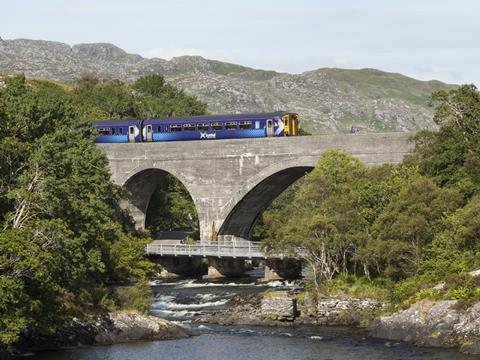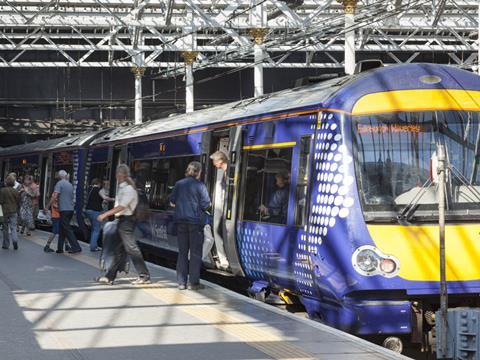
UK: Facing the possibility of a long-term reduction in passenger numbers following the pandemic, ScotRail has begun a two-month consultation on a permanent cut in weekday services from around 2 400 to 2 100 trains from May 2022.
Some journey times would be increased and off-peak frequencies reduced under the ‘Fit For The Future’ timetable, which aims to match services levels to predicted ridership while also providing value for money for taxpayers. ScotRail said ‘most customers will find the number of calls at their station and the destinations served are similar to today’. although there would be greater changes in some areas.
The operator’s analysis found that prior to the pandemic significantly more seats were being provided on some routes than required for the number of passengers travelling. One example quoted fewer than 5½ million passenger-miles being completed on a typical weekday, meaning 23% of available seats were actually used.
Returning to a pre-pandemic timetable ‘would result in trains operating 26 million more vehicle-miles each year for little customer benefit’. As well generating unnecessary emissions, this would increase costs to the taxpayer ‘by £30m to £40m each year’.
ScotRail said its proposed timetable would focus on ‘improved punctuality and reliability of services, building on the record punctuality delivered during the pandemic’, which research by Transport Focus had highlighted as a key priority for passengers. The new methods of analysis developed during Covid-19 would be used to refine and improve the service offered in the future as the operator learned more about how travel behaviours were changing.

‘The pandemic has changed how people travel across all of Scotland, so our services will reflect these varied travel patterns and deliver timetables that are reliable, have enough capacity to meet pre-Covid levels of demand, and are sustainable’, said Alex Hynes, Managing Director of Scotland’s Railway. ‘We are consulting on the timetable changes being proposed and we would welcome the views of our customers.’
Operations Director David Simpson emphasised that the need to offer value for money as well as meeting the needs of customers was vital as the railway emerges from the impact of the pandemic.
‘That might mean offering a different service on different days of the week or different times of year as passenger demand varies across the week or through the year. But by doing so, we can ensure Scotland’s Railway remains sustainable into the future.’
Climate change concerns
The proposals were condemned by the four main rail unions, with ASLEF, RMT, TSSA and Unite presenting a united front. They noted that the consultation would close days before the COP26 climate summit which will include an entire day devoted to transport issues.
‘It is incredible that in the year that the world comes to Scotland to debate the very future of our planet that ScotRail is proposing cuts to rail services in a transparent attempt to use the pandemic as cover for cuts’, the unions said in a joint statement.
‘These plans would not only cull jobs, they would hit the most vulnerable hardest including elderly and disabled people. All the while diverting many passengers back onto the roads and increasing pollution, congestion and greenhouse gases. It is exactly this type of short-term thinking that has contributed to the climate crisis.’



